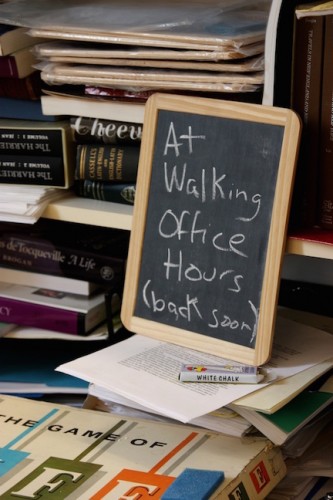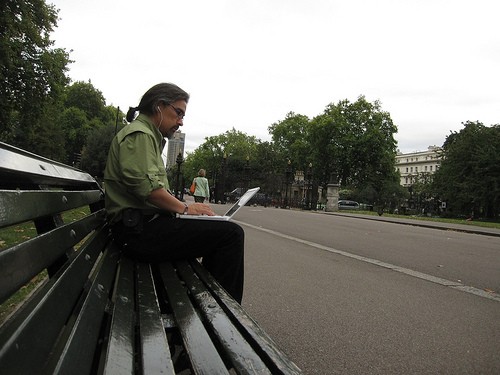There are abundant essays and blog posts out there about how to boost your writing productivity (like this, this, and this). The advice contained therein can be helpful, depending on your professional situation and your personality: set specific times for writing; challenge yourself to produce a certain number of words per day; take breaks to eat healthy snacks or do jumping jacks; give yourself rewards for writing tasks accomplished.
But sometimes these strategies don’t work: you aren’t feeling motivated to do anything but binge-watch “House of Cards”; you may feel “blocked” or you may just feel overloaded; your brain can’t focus on producing words that make sense on the page. Sometimes you need to get more creative, to hack your writing by trying something new — and a little odd.
1. Walking Office Hours

If you are a professor, you know that during the semester it can be incredibly difficult to write between classes, prepping for classes, meetings with colleagues and students, answering official emails, and university events. In order to find time, it is often necessary to multi-task.
Walking Office Hours comes to us from Jill Lepore, a historian who inspires widespread amazement and envy due to her incredible productivity: 4 books in 5 years, essays every few months for the New Yorker, etc. Yes, Lepore has a nice gig at Harvard, with TAs and pretty great students and a relatively light teaching load. But even she is crunched for time, and to find time where there wasn’t any before, she meanders around Harvard Yard or Cambridge while chatting with students and thesis advisees.
Pros: delights students with its weirdness; fresh air
Cons: requires sensible shoes
2. The Ski Mask
Now, this may seem creepy.

But years ago, the fiction writer Kent Haruf gave an interview in which he revealed that in order to write, he would descend into his basement, sit at a desk with only a typewriter and a lamp on it, and put on a ski mask. His mask — unlike the one pictured at right — did not have eye holes; his functional blindness forced him to just pound out the story.
Pros: The sensory deprivation allows you to enter the world of your subjects more fully; compels you to move your narrative forward; sharpens typing skills
Cons: sweaty, probably also itchy; might terrify your family members
3. Typewriters <ding!>
Speaking of Kent Haruf’s typewriter – switching up your technology is a promising strategy.
A friend of mine has recently abandoned her computer and turned to a typewriter; she’s hoping that this will help her stop obsessing about revising single sentences. On a typewriter, you cannot just press the delete button; if you do, you must have your Wite-Out at the ready. Also – and more obviously – the typewriter is blissfully free from Internet bookmarks; there is nothing but the page.

You can even abandon technology altogether if need be. I know several historians who have written entire book manuscripts by hand – in pencil, pen, and … wait for it … fountain pen. These are historians of a certain generation, of course – those who learned to write by hand and wrote the majority of their first essays (possibly those that made them fall in love with writing) by putting pen to paper.
Pros: allows you to write without reflexive editing; removes the temptations of the World Wide Web
Cons: decreases writing speed; dragging a typewriter to the office or a café is a pain in the ass; do they even make Wite-Out anymore?
4. Haikus
Changing your form can be just as beneficial as changing your tech. I’m not suggesting that people start writing their books as tweets or computer code. But letting your brain think about how to convey your ideas in a different structure – even in a form that we use everyday without really thinking about it, like email – can be freeing, and inspiring. What would your book’s argument look like as a haiku? How would this chapter read as a scene in a screenplay?
Pros: your brain rewires itself, becomes rejuvenated; new arguments or ideas may come to light; may find new career as a screenwriter
Cons: may find new career as a screenwriter
5. Subways and Park Benches
When you think of yourself writing, where are you? Probably sitting at a desk in an office, or a table in a café. The desk is solitary, quiet, you can pile up your papers and your books willy-nilly. The café is crowded and loud, people will notice if you start watching Netflix.
But what about other kinds of places? Last week, I took my car to get its annual emissions test and brought my computer along – I had no idea how long I would have to wait, and I figured I would go to the pizza place next door and hang out. But lo and behold, Doherty’s Garage has a waiting room, complete with comfortable chairs, free Wi-Fi, and a bowl of York Peppermint Patties. Writing nirvana.

If you like the quiet places, consider the closet: one of my friends retreats there when she needs to really think things through. But if crowds are your thing, search out what historian Heather Richardson referred to in a Facebook conversation as “liminal spaces”: places “where people are bustling around you and you are somehow separate.” Those chairs in the mall, usually reserved for dudes bored out of their minds. Park benches. The bleachers at a kid’s volleyball tournament (doesn’t have to be your kid).
Writing in transit can be a fruitful experience; so many people were enthusiastic about writing on Amtrak trains that the company started a fellowship program for writers in 2014. It is unclear if they will continue this program in 2015, however. If you live in a large city, there are more options for writing on-the-go: a young scholar I know rides the New York subway with his laptop – he’s not going anywhere in particular, he’s just writing.
Pros: background noise (or lack of it) helps you block out other distractions and focus; the conviviality that public places bring helps combat loneliness
Cons: restrooms? electrical outlets?; may be in violation of vagrancy laws
Thanks for the mention of the Amtrak Residency – with link. Sounds really interesting
Even though that story about Lincoln writing the Gettysburg Address on the back of an envelope while riding the train is a myth, there is something appealing about the idea of writing on a train. It has tremendous potential for inspiration: the journey to — or from — something, fellow passengers, the sights along the way, the bustle of city stations or loneliness of little, rural depots. Maybe Amtrak is onto something!